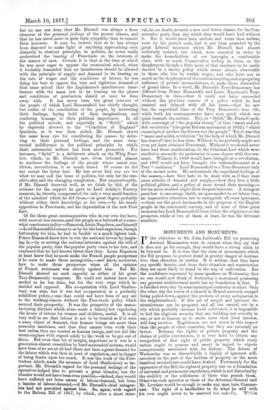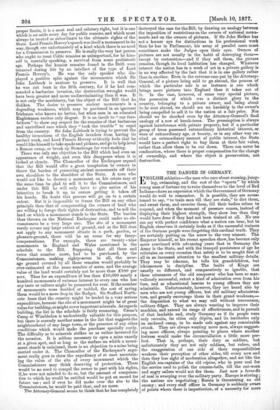MONUMENTS AND MONUMENTS.
IF the objectors to Sir John Lubbock's Bill for preserving Ancient Monuments were in earnest when they say that it does not go far enough, they would have a strong claim to be listened to. It is true that the class of monuments which the Bill proposes to protect stand in greater danger of destruc- tion than churches or castles. It is seldom that they have any specific beauty, and from their situation and construction they are more likely to stand in the way of cultivation. But the confidence expressed by some speakers on Wednesday that no one would now think of destroying a monument possessing any genuine architectural merit has no foundation in fact. It is falsified every day by some municipal authority or other. Only the other day the tower of a church in Bristol narrowly escaped being pulled down, against the protests of every antiquarian in the neighbourhood. If this act of stupid and ignorant de- structiveness can be proposed and all but carried out in a city which probably esteems itself cultivated, it is impossible to feel the slightest security that any building not actually in use, or not so famous as to excite more than local interest, will long survive. Englishmen are not worse in this respect than the people of other countries, but they are certainly no better. Between the rights of private property and the claims of public convenience, it is very hard to obtain any recognition of that right of public property which every nation ought to possess and assert in regard to objects conspicuously associated with its history. The debate of Wednesday was as discreditable a display of ignorant self- assertion on the part of the holders of property as the most fanatical revolutionist could have desired. Fortunately for the opponents of the Bill,the rights of property rest on a foundation of universal and permanent expediency,which is not disturbed by the stolidity or the selfishness of those who preach them. Otherwise such speeches as those of the Attorney-General and Mr. Lowther would be enough to make any man turn Commu- nist. The right of a landholder to do what he will with his own ought never to be asserted too nakedly. Within proper limits, it is a most real and salutary right, but it is one which is set aside every day for public reasons, and which must always be treated as subordinate to the ultimate rights of the State. Lord Francis Hervey's speech was itself a monument in its way, though one unfortunately of a kind which there is no need for a Commission to preserve. He is really the very last person who ought to treat Celtic remains as unimportant, for he him- self is, mentally speaking, a survival from some prehistoric age. Perhaps the human remains found in the Drift were tenanted during life by an intellect of the type of Lord Francis Hervey's. He was the only speaker who dis- played a positive spite against the monuments which Sir John Lubbock is anxious to preserve. It is well that he was not born in the fifth century, for if he had com- manded a barbarian invasion, the destruction wrought would have been greater and more undiscriminating than it was. It is not only the machinery, but the object of the Bill that he dislikes. The desire to preserve ancient monuments is a degrading weakness, which may be pardoned in an ignorant Irishman who knows no better, but when seen in an educated Englishman excites only disgust. It is an insult to "our fore- fathers" to show any respect for the remains of that barbarous and uncivilised race which they "took the trouble" to expel from the country. Sir John Lubbock is trying to prevent the healthy iconoclasm of the English invaders from having its perfect work, and Lord Francis Hervey evidently feels that he would like himself to take spade and pickaxe, and go to help level a Roman camp, or break up Stonehenge for road-making.
There was only one objection to the Bill which had even an appearance of weight, and even this disappears when it is looked at closely. The Chancellor of the Exchequer argued that the Bill would offer a great temptation to owners to throw the burden of preserving ancient monuments off their own shoulders to the shoulders of the State. A man who would not like to destroy a monument on his estate may at the same time be glad to sell it to the Commissioners, and under this Bill he will only have to give notice of his intention to break it up to ensure getting it taken off his hands. No doubt this process will go on to a certain extent. But it is impossible to frame the Bill on any other principle than that of compensating the owners of land who are willing to forego their rights of destruction, and to sell the land on which a monument stands to the State. The burden ' thus thrown on the National Exchequer could under no cir- cumstances be a very large one. The site of a monument rarely covers any large extent of ground, and as the Bill does not apply to any monument situate in a park, garden, or pleasure-ground, there will be no room for any fancy- compensations. For example, there are twenty - nine monuments in England and Wales mentioned in the schedule to the Bill. Supposing that all these and twice that number more, had to be purchased, by the Commissioners, making eighty-seven in all, the aver- age ground covered by all these remains would probably be over-estimated at the same number of acres, and the average value of the land would certainly not be more than £100 per acre. Thus for an expenditure of less than £10,000 nearly a hundred monuments of extreme interest to every one who has any taste or culture might be preserved for ever. If the number of monuments were doubled or trebled, the cost of saving them would be a mere drop in the Budget. Sir Stafford North- cote fears that the country might be landed in a very serious expenditure, because the site of a monument might be of great value for building, or might cover important minerals. As regards building, the list in the schedule is fairly reassuring. Ciesar's Camp at Wimbledon is undoubtedly valuable for this purpose, but there is scarcely another name in the list that suggests the neighbourhood of any large town, or the presence of any other conditions which would make the purchase specially costly. The difficulty as to minerals strikes us as rather invented for the occasion. It is seldom necessary to open a mine exactly at a given spot, and so long as the surface on which a monu- ment stands is uninjured, there is no objection to a mine being tarried under it. The Chancellor of the Exchequer's argu- ment really goes to show the expediency of at once ascertain- ing the value of the site of every monument which the Commissioners may think deserving of protection. There would be no need to compel the owner to part with his rights, ithe were not minded to do so, but the amount of compensa- tion to which he would be entitled would be put on record for future use ; and if ever he did make over the site to the Commissioners, he would be paid that, and no more. The Attorney-General seems to think that he has completely destroyed the case for the Bill, by drawing an analogy between the imposition of restrictions on the owners of national monu- ments and on the owners of pictures. If Sir John Holker has not a keener eye for distinctions in his professional work than he has in Parliament, his array of parallel cases must sometimes make the Judges open their eyes. Owners of pictures are not usually in the habit of destroying them— except by restoration—and if they sell them, the picture remains, though its local habitation has changed. Whatever interest the nation has in a work of art in a private gallery is in no way affected by the fact that it is in one gallery rather than in another. Even in the extreme case put by the Attorney. General, of a picture being sold to go abroad, the process of which the particular sale is an instance is one which brings more pictures into England than it takes out of it. In the case, however, of some very special picture, the possession of which was a distinct glory to the country, belonging to a private owner, and being about to be sent abroad, we should see no hardship in the owner's being compelled to sell it to the nation at a fair price. Nor should we be shocked even by the Attorney-General's final analogy of a row of beech-trees. The presumption is always against interference with private property, but if a particular group of trees possessed extraordinary historical interest, or were of extraordinary age, or beauty, or in any other way ex- cited an extraordinary amount of public interest, the State would have a perfect right to buy them at their fair value, rather than allow them to be cut down. There can never be confiscation, where there is proper compensation for the change of ownership, and where the object is preservation, not destruction.



































 Previous page
Previous page